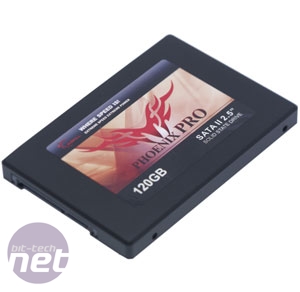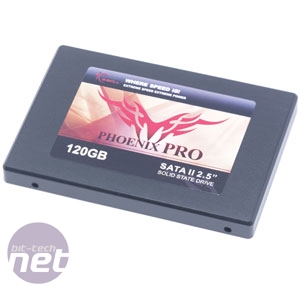
Results Analysis
As with all SandForce drives, the G.Skill Phoenix Pro’s performance was extremely dependent on the data which the drive is handling. When handling the mostly incompressible data in AS SSD we saw the worst-case scenario, with the Phoenix Pro managing read speeds of 207MB/sec and write speeds of 130MB/sec. This dropped to 86MB/sec after extended use and TRIMing. This is typical of all SandForce drives (including the drop in performance following heavy use).ATTO disk benchmark’s data is, in contrast, a best-case scenario for a SandForce drive, as it’s highly compressible. This resulted in a read speed of 278MB/sec and a write speed of 270MB/sec, close to the maximum speeds possible via a SATA 3Gbps port. It’s also worth noting that these speeds showed no degradation following extended use and TRIMing, indicating that SandForce’s on-the-fly compression technology can mask performance degradation over time to some extent.
A random read speed of 53MB/sec and a random write speed of 68MB/sec are similarly impressive. The Phoenix Pro has benefitted from the SF-1500 firmware, as it has notably superior write latencies than the 100GB SandForce SSDs we’ve seen previously.
Real-world performance was identical to that of the 100GB drives though, and loading STALKER: Call of Pripyat took 24 seconds. To see real improvements in these sorts of circumstances, you’ll need to use a SATA 6Gbps drive able to surpass 300MB/sec read speeds, such as the Crucial C300.
Conclusion
We’ll admit it was hugely frustrating for us when, as we were wrapping up our first SandForce coverage looking at 100GB drives, the first 120GB drives started appearing in shops claiming identical performance for the same price. As we’ve seen from our results, those claims were entirely true, making the original 50GB, 100GB and 200GB SandForce drives pointless, even a few weeks after they were launched.It’s disappointing that the only difference between the new and old SandForce drives is a firmware update, and yet this firmware has not been released for anyone who bought a 50GB, 100GB or 200GB SandForce drive.
Away from SandForce’s mistake though, the G.Skill Phoenix Pro 120GB is certainly an impressive drive, and delivers on the promise of SandForce’s hyperbole. The formatted capacity of 111.69GB is enough an operating system, taxing programs and a healthy handful of games, while the undoubted speed of the SandForce controller equipped with the SF-1500 firmware makes for a very nippy SSD indeed.
Sadly it’s not all plain sailing for the Phoenix Pro though, and a major stumbling block is price. The near-identical OCZ Vertex 2E 120GB can be found for £35 less, and the Crucial C300 128GB, which offers noticeably superior read speeds at the cost of a much lower 140MB/sec write speed, can be found for a similar £258.49. Against these drives, G.Skill’s pricing doesn’t stand up, even if the drive’s performance does.
- Performance
- x
- x
- x
- x
- x
- x
- x
- x
- x
- -
- 9/10
- Features
- x
- x
- x
- x
- x
- x
- x
- -
- -
- -
- 7/10
- Value
- x
- x
- x
- x
- x
- x
- -
- -
- -
- -
- 6/10
- Overall
- x
- x
- x
- x
- x
- x
- x
- -
- -
- -
- 7/10

MSI MPG Velox 100R Chassis Review
October 14 2021 | 15:04











Want to comment? Please log in.